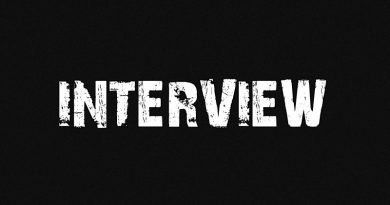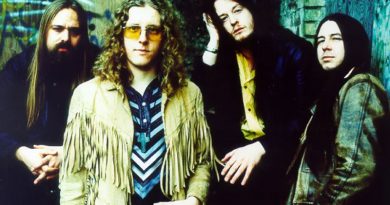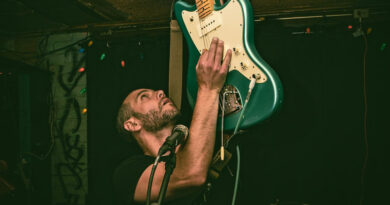Orgöne Interview
Orgöne are a wild band. On their debut album, Mos/Fet (out the 19th of June on Heavy Psych Sounds), the French band marries Sabbathian riffs to mad Rock In Opposition jams to late 60’s Detroit freakout to epic progscapes. Their music is a dense, heady mix that rolls like the soundtrack to the grooviest, most psychedelic sci-fi movie never made. I caught up with the band via email to talk Afrofuturism, the Soviet Space program, the power of language, and the importance of a good jam.
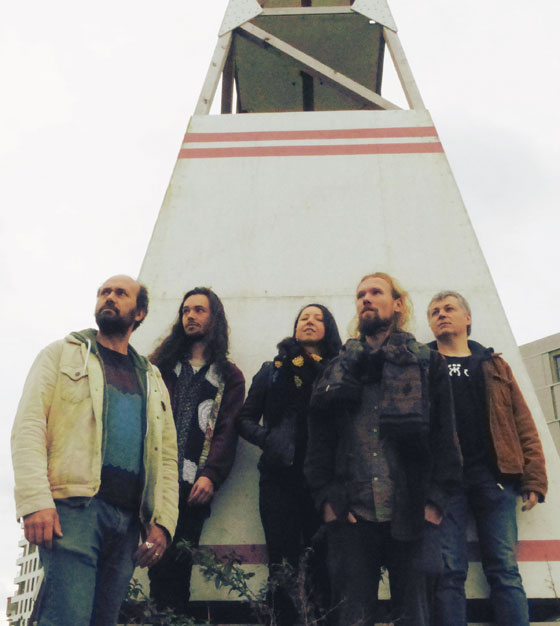
This is a very strange time. How are things in France at the moment?
Olga (Vocals): Everything is weird, people are afraid of any contact. The quarantine impacted the release of our album with Heavy Psych Sounds. The label is based in Italy, where the European crisis started. We initially planned to release our album in May. Unfortunately, the label had to postpone. On our side, we’re waiting for the end of quarantine so we can play together again and work on our new tracks and songs.
Marlen (Guitar): Before the quarantine we were busy composing the tracks for our second album – we had plenty of stuff to work on! And then, everything stopped.Some years ago I wrote my PhD about William Burroughs, his cut-up novels, and his idea of the word as a virus, and the machine of control, so it’s strange nowadays to feel like being stuck in a Burroughs novel. Orgöne’s lyrics often deal with dystopian universe, parallel worlds… we feel like being stuck in a much too long Orgöne track!
How did Orgöne come together?
Marlen: It’s a long story… In 2014, fed up of almost everything in music, after having played in many bands, I met Nick (bass), he brought a drummer with him, we began to play together, in a proto-Orgöne trio. We were in a, say, born-again attitude, we had no plan, it was a back to the basics mood, we just wanted to play, anything, and to see and hear what would happen. So, the music came together almost by itself, with noise accents, psych moods, rock riffs, and even a punk feel, due to Mat, our former drummer.
Nick suggested we recruit a female singer, which was a great idea and we found Olga, who is half French-half Polish. It was a major change. I began to write lyrics for her specific voice, to imagine Soviet/Russian imaginary landscapes, with dead cosmonauts etc. At that time I had already made some collages, with Easter Island statues, cosmonauts, Egyptian stuff… So our ‘Orgönic’ universe came from all that stuff. We decided on the name Orgöne when Olga came on board.
And finally, at the end of 2017, we were very lucky to recruit Allan on drums. He suggested we recruit Tom, who is a multi-instrumentalist, on keyboards. Allan and Tom were mostly interested in our longer pieces, so we threw away almost every song we had, just kept some riffs and lyrics, and we went back to the basics again – a second ‘born again’ moment in Orgöne’s life.
With Olga and Nick we had explored so much territory during those formative years that in 2018, when the actual line-up came together, with Allan and Tom, it allowed us to give birth to the music we really wanted to play. So, one could say that the real, actual Orgöne was born in 2018.
Allan (Drums): I would add that when Nick asked me to play with Orgöne (on my birthday in 2018), I was really curious about the raw and almost punk feel of their songs. There was an energy that I had never really experienced as a drummer, so I wanted to try and play these kinds of things. But I quickly brought my own influences and we began to rework most of the songs, going to a more prog aesthetic, with less post-punk influences (even if this post-punk heritage is still there I guess, even in a microscopic dose). I feel that coming on board, I helped the band develop their ‘orchestral’ side, with longer tracks, because my drum playing is suited to those longer songs, as I’m deep into jazz, fusion, world music and 70s prog.
With Olga and Nick we had explored so much territory during those formative years that in 2018, when the actual line-up came together, with Allan and Tom, it allowed us to give birth to the music we really wanted to play….
The songs have really solid arrangements and are very tight, but never feel ‘too tight’. What’s your songwriting process? Does improvisation play a role?
Marlen: Our way of composing is in fact a strange mix of chance and science.
To give you an idea: we gave birth to our piece Astral Fancy in several different ways. One day I played a riff at the beginning of a rehearsal, we improvised around it, and luckily, we recorded it. Six months later, at the end of a concert we decided to play a complete improv. Tom launched an Autobahn style repetitive riff, I played this old rehearsal riff, it evolved into an interesting improv. We then decided that, on our planned first studio record, we should have a studio improv on the D side of a double LP. But, in the rehearsal studio, we began to play this improv… and it evolved into an arranged, ‘tight’ piece.
Olga found something she had sitting in her bag for one or two years – a strange nonsense text coming from weird translation software. Olga and I worked from those and we both added to it. It gave us the theme of the track and allowed us to create new stuff around this idea.
Nick found a monolithic bass riff for a new part, we also used an old riff from another rehearsal improv for the drum solo part. So, we patiently built a long track that was still tight, using bits and pieces from different sources. This is Orgöne: half tight, half chaos.
Tom (Keys): And sometimes Marlen comes up with a pretty loose idea of the track, like a melody or a chord progression, then Nick adds a bass line, Allan decides on the rhythmic aspect of the idea, and I add the missing notes to add a little bit of colour, atmosphere, and once the whole thing is pretty tight, Olga and Marlen add the lyrics. Each of us can have, sometimes, a very defined role in the composition process although it has never been spoken of.
For some of the tracks we come up with sections and then we decide how to arrange them while sometime adding some transitions. Improvisation plays a role in the sense that it allows us to experiment and compose in real time. We have a natural tendency to lock-up to ideas we find interesting so most of the time when we decide to improvise, it goes up to a point where we’re not improvising anymore but instead looping an idea to see how far we can go with it.
Allan: It’s mostly like having a big block of granite in front of us, and sculpting it. Everyone in the band brings their own influences; solid basslines, guitar riffs and drones, incantations, keyboards harmonies and sonic tricks. For myself, I try to find original rhythmic ideas; I try to think about different structures and meters (I love rhythms in 7 or other odd timings). We listen back, regularly, to see if our block of granite became a good sculpture – sometimes we have to go back to work and to work again on sonically sculpting.
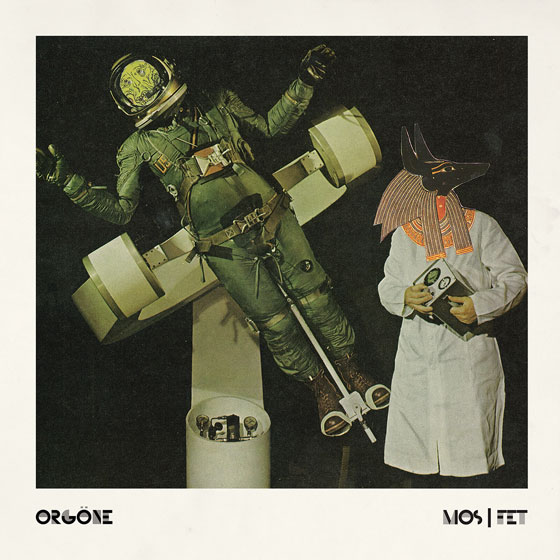
Lyrically, space seems to be a major theme, space and ancient Egypt. How do they tie together?
Marlen: Many years ago I began to work on collages. I mixed space comics stuff with Egyptian pictures. So, this theme came naturally to us. I’m also very fond of the free jazz from the end of the sixties. Those African American guys fantasied about the cradle of black civilisation, ancient Egypt, Ethiopia; what was called Panafricanism and Afrofuturism.
For many years I’ve been fascinated with musical pieces like Upper Egypt/Lower Egypt by Pharoah Sanders, Tutankhamun by The Art Ensemble of Chicago, or the music and films by Sun Ra. I also saw the movie Lucifer Rising by Kenneth Anger, I was stuck by this strong image of UFOs above the Sphinx and Pyramids – coincidently, it was matching with me doing a mix of Egypt/Easter Island/cosmonauts collages.
So it all came from that cultural stuff and also by my reading of science fiction authors like JG Ballard and Michael Moorcock. I feel that this aesthetic is really powerful, opening the gates of a strong imaginary landscape. In our lyrics we’re, in a way, dreaming about a space conquest that went totally wrong, with the corpse of dead cosmonauts from the cold war floating in infinite space, or even space-travelling and coming back to ancient times. And we use the collages that I make for our artworks, to create a coherent universe.
Olga sings in four different languages, how does she decide which one to use for a given song, or part of a song?
Olga: Language naturally imposes itself according to the theme of each song. English is the basis of our texts, co-written by Marlen and me. The Slavic languages fit well into Soviet aesthetics. Russian and Polish evoke something exotic, referring to the Cold War period and the Russian conquest of space, they put a little more distance than English. Varying languages makes it possible to keep everyone awake, to surprise with incongruous, unexpected associations, and also to remember that there are a multitude of listeners for our music.We usually avoid using French, I guess because this is a sacred language for Marlen!
Some vocal atmospheres are easier to render in a specific language. When I look for a percussive voice I tend to turn to English, Polish allows me to find a natural rhythm of speech, Russian is more singing and surprising. Each musical theme evokes emotions that I want to convey. When I can’t find a word, I fall back on screams and sound effects. This is my favorite part. Some vocalizations were wonderfully sublimated during the mixing of our album by Tom. This gives an atmospheric and melodic side to the music.
Varying languages makes it possible to keep everyone awake, to surprise with incongruous, unexpected associations, and also to remember that there are a multitude of listeners for our music.We usually avoid using French, I guess because this is a sacred language for Marlen!
There are also WTF texts, like Astral Fancy, which was generated by software accident. Astral Fancy is an automatic transcription of a conversation in French. These are really inspired lyrics, because they literally fell on me. The language here becomes an insignificant useful medium for a message from another world. Astral Fancy tells a story of divinity, of magic and the strangeness of a cult. It’s our quintessential closing ritual that goes so well in concerts!
Marlen: Sacred? Hell no! Well, to me French is much too ‘literary’, with complex and long sentences. Singing in French is really difficult and perilous, one can easily sound like French ‘variété’, cheap pop muzak with cheap lyrics who pretend to be ‘poetry’, that are really inflated and shitty. Definitely, I feel that it’s better for us to avoid French for the singing.
The songs have an epic, cinematic feel, what are some of your favourite films?
Marlen: One day, Nick came with the idea of composing a long, powerful piece. After thinking about what could be done, I suggested we work on an alternate soundtrack for Lucifer Rising by Kenneth Anger. This was when we composed our first long, twenty minute piece. And even now, when we think about new tracks, we try to create a kind of imaginary soundtrack. That’s maybe the reason of this cinematic feel.
We all love a lot of different movies in the band. I love many films, but I especially like the experimental films from the 60s, like the ones of Kenneth Anger, Ira Cohen, Michael Snow, etc. Those artists try to push the boundaries and to create, as we also try to do, specific inner landscapes.
Nick: We also like movies by John Carpenter, or B-movies, even Z-movies. Our music and our lyrics are not so serious,we also try to deal with humour, like in some Z-movies. It’s the same for music, we like a lot of ‘alternative’ bands, but many of us also love direct rock bands like The Stooges.
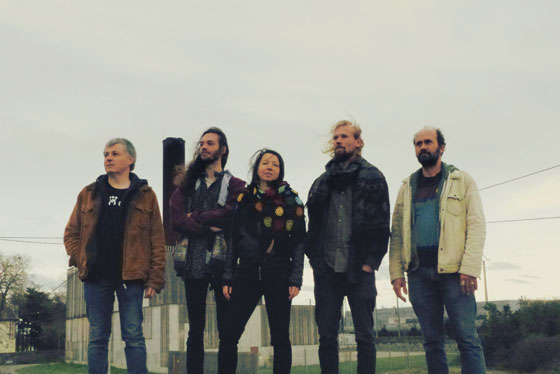
I saw you mention Rock In Opposition. Those bands aren’t referenced very often. Who are some of your favourites from that movement?
Marlen: My own love for Rock In Opposition (RIO) bands is a long one. In fact I like a lot of bands and musicians that are in opposition to mainstream music, affiliated or not to the RIO scene.
At the end of the 90s, when post-rock was reshaping the rock universe, I was already deep into alternative music, mostly European bands that were trying to experiment with another vision of rock music. For example the German krautrock scene, which is very complex and rich; bands like Amon Düül 2, Can, Faust, Guru Guru, Ash Ra Tempel, even Kraftwerk. Those guys were, in a way, already in opposition to all the bad Rolling Stones copies. It was the same in France, between 1968 and 1978 there was a lot of wonderful alternative/underground bands, like Magma and Gong of course, but also Red Noise, Komintern, Lard Free, Fille Qui Mousse, Heldon etc. Strangely, all those bands were forgotten during the 80s and 90s here in France. Their records were unavailable, it was like a hidden treasure. I remember, in the pre-internet era, the time I spent searching for those records in second-hand shops.
I would also say that I’m deep into bands affiliated to prog music, of many kinds, including RIO. And I never felt such a big difference between prog bands like early King Crimson or Van Der Graaf Generator, and punk bands. Alan Holmes (guitar player from the Eelsh band Ectogram) told me one day that in 1977 he was listening to Yes AND the Sex Pistols, there was no problem in listening to both. So, RIO showed us a way to mix prog with punk energy, with bands like The Work, Henry Cow, or in France the excellent band EtronFouLeloublan – it was natural to me, in a way, to listen to that kind of stuff.
I also spent seven years playing in the French band La STPO (which stands for La Société des Timides à la Parade des Oiseaux ). This band is affiliated with RIO. Those guys are absolute fans of RIO, and of Pere Ubu, Wire. They like everything that is in opposition – like me. I even played with La STPO, at the Avantgarde Festival, run by Jean-Hervé Péron of Faust. I was lucky enough to meet Geoff Leigh of Henry Cow, the people from Faust, Charles Hayward (drummer of This Heat). Later I even played, with 10 other musicians, with Faust, for a special masterclass. Such magic moments.
Strangely, all those bands were forgotten during the 80s and 90s here in France. Their records were unavailable, it was like a hidden treasure. I remember, in the pre-internet era, the time I spent searching for those records in second-hand shops…
Tom: RIO and the Canterbury scene also are huge influences to me as a keyboardist. First of all I only use vintage organs and keyboards (except for a Behringer model D in the studio) because it’s what my ears are used to and also because I know how to repair them.
My ‘basic’ sound as an Orgöne member is built with the help of a combo organ combined with a Wha pedal and different flavours of overdrive and fuzz, this is heavily inspired by bands like Soft Machine, Henry Cow, National Health, Hatfield And The North, Egg etc. I will personally always put Henry Cow on top of the avant-prog / RIO / Canterbury scene, the disgusting sounds that Hodgkinson was able to achieve with only a combo organ and a fuzz are still unrivalled today, although I’d say Mike Ratledge from Soft Machine is a close second.
Now, to answer your question properly I’d say my favourite bands from, or affiliated to, this movement are (not ranked) : Henry Cow, Art Bears, Gong, almost every band with Dave Stewart in it (Khan, Egg, National Health, Hatfield And The North, Azrachel), Potemkine, Magma, Picchio del Pozzo, Vortex, L’infonie and CaptainBeefheart.
Marlen: Incidentally I wrote a book about Beefheart, here, in France.
Do you have plans to tour when things calm down?
Marlen: Yes. We plan to play. We miss the tube amps’ heat and fury. We had plans before the quarantine, in Germany, France and Belgium. We are a powerful live band, and we play our long suites just as they are on the record. We first played those tracks live, before recording them. So we look forward to play concerts again!
Thanks Orgöne for answering our questions and their debut album Mos/Fet will be released on CD, digital download and various vinylpressings on the 19th June via Heavy Psych Sounds.
Label: Heavy Psych Sounds
Band Links: Facebook | Bandcamp | Instagram
Interviewed by: Neddal Ayad

